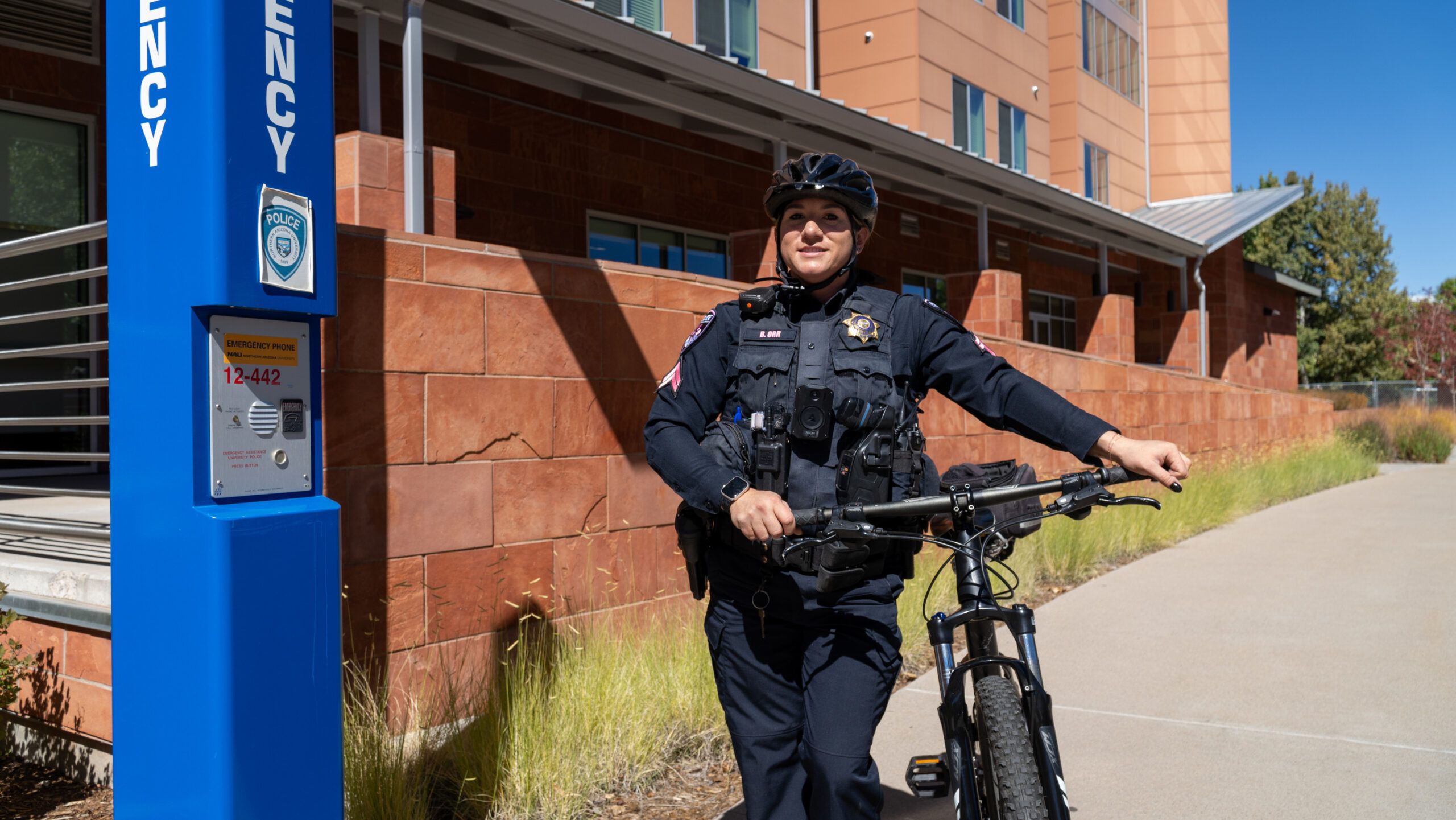
Campus safety
NAU is committed to keeping students, employees, and visitors safe through dedicated programs, trained personnel, and campus-wide collaboration. Our Threat Assessment and Management Team (TAMT) is a coordinated group that includes representatives from NAU Police, Human Resources, Student Affairs, and Legal Affairs, working together to address safety concerns and respond appropriately. Use our emergency and campus resources guide to quickly find who to contact in urgent situations. .
NAU Safe app
The NAU Safe app is your personal safety tool. It provides real-time alerts, emergency contacts, reporting tools, and safety resources, right on your phone. Stay informed, stay connected, and be prepared.
Safe Walk Program
Don’t walk alone after dark, use Safe Walk. Escorts are available every night from dusk to dawn for on-campus travel. From Thursday to Saturday, hours run 9 p.m.–3 a.m., and Sunday through Wednesday, 8 p.m.–midnight. Outside those hours, police aides or patrol officers can help.
Campus Living Communities
Security is built into every residence hall. Exterior doors require a valid JacksCard to access, and each room is individually keyed. For additional support, on-call Community Assistants and Community Coordinators are available to assist students. Housing changes can be requested when needed for safety reasons.
NAU Police Department
NAU Police are certified law enforcement officers who serve the Flagstaff campus and other university properties. They provide 24/7 support, respond to incidents, and share educational safety resources, including videos and online training through 360º Stay Safe™.
Student support and accountability
NAU’s Office of Student Rights and Responsibilities helps students understand community expectations and navigate challenges. The office also provides guidance on student conduct and connects students who’ve experienced gender-based harm with the Title IX Coordinator for support and reporting options.
Emergency planning
NAU’s Office of Emergency Management prepares the university for natural disasters, medical incidents, and other emergencies. It supports real-time response and recovery while educating the campus community on readiness and safety procedures.
Clery Act
Northern Arizona University complies with the Jeanne Clery Disclosure of Campus Security Policy and Campus Crime Statistics Act, or Clery Act, a federal statute requiring all colleges and universities that participate in federal financial aid programs to compile crime statistics from their campuses and provide safety information. Disclosures about crime statistics and policy statements are made by October 1 each year in an Annual Security Report and ongoing disclosures about specific crimes and emergencies are made available throughout the year.
The Clery Act requires institutions to disclose four general categories of crime statistics. The Clery Act requires that all Clery reportable crimes be identified by geographic location. The definitions for these geographic categories are Clery Act specific and are the same for every institution regardless of its physical size or configuration.
Criminal offenses
- Murder and non-negligent manslaughter
- Manslaughter by negligence
- Sexual assault: rape, fondling, incest, and statutory
- Rape
- Robbery
- Aggravated assault
- Burglary
- Motor vehicle theft
- Arson
- Hazing
Hate crimes
A hate crime is a criminal offense that manifests evidence that the victim was intentionally selected because of the perpetrator’s bias against the victim. Bias is an expressed negative opinion or attitude toward a group of persons based on actual or perceived race, gender, gender identity, religion, disability, sexual orientation, ethnicity or national origin.
For Clery Act purposes, Hate Crimes include any of the following offenses that are motivated by bias.
- Murder and non-negligent manslaughter
- Sexual assault: rape, fondling, incest, and statutory rape
- Robbery
- Aggravated assault
- Burglary
- Motor vehicle theft
- Arson
- Larceny, theft
- Simple assault
- Intimidation
- Destruction/damage/vandalism of property
Violence Against Women Act (VAWA) offenses
- Dating violence
- Domestic violence
- Stalking
Arrest and referrals
The number of arrests and the number of persons referred for disciplinary action for the following law violations:
- Weapons: carrying, possessing, etc.
- Drug abuse violations
- Liquor law violations
On campus
Any building or property owned or controlled by an institution within the same reasonably contiguous geographic area and used by the institution in direct support of, or in a manner related to, the institution’s educational purposes, including residence halls; and
Any building or property that is within or reasonably contiguous to the area identified in paragraph (1) of this definition, that is owned by the institution but controlled by another person, is frequently used by students, and supports institutional purposes (such as a food or other retail vendor).
On campus student housing
Any student housing facility that is owned or controlled by the institution, or is located on property that is owned or controlled by the institution, and is within the reasonably contiguous geographic area that makes up the campus is considered an on campus student housing facility.
Public property
All public property, including thoroughfares, streets, sidewalks, and parking facilities, that is within the campus, or immediately adjacent to and accessible from the campus.
Non campus
Any building or property owned or controlled by a student organization that is officially recognized by the institution; or
Any building or property owned or controlled by an institution that is used in direct support of, or in relation to, the institution’s educational purposes, is frequently used by students, and is not within the same reasonably contiguous geographic area of the institution.
Northern Arizona University obtains reportable crime statistics associated with its Clery geography by collecting information from a variety of individuals and organizations that Clery considers to be Campus Security Authorities (CSAs). In addition, the University requests crime and arrest statistics from local law enforcement agencies. The crime statistics disclosed in the University’s Annual Security Report are statistics based on reports of alleged criminal incidents. Under Clery, it is not necessary for the crime to have been investigated by the police or a CSA, nor must a finding of guilt or responsibility be made to include the reported crime in NAU’s crime statistics.
For questions regarding CSAs, statistics, reporting, or other Clery related questions, please contact NAU’s Director of Clery Compliance, Alicia Beekman at alicia.beekman@nau.edu or 928-523-3611



